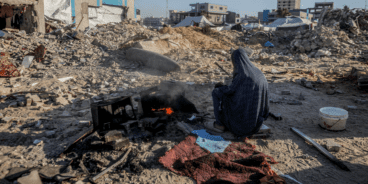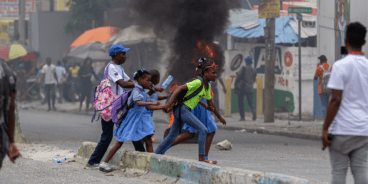Atrocity Alert No. 79: Yemen, Myanmar (Burma) and Afghanistan
Atrocity Alert is a weekly publication by the Global Centre for the Responsibility to Protect highlighting situations where populations are at risk of, or are enduring, mass atrocity crimes.
War crimes, starvation and the Yemen blockade
Following the firing of a ballistic missile into Saudi Arabia by Houthi forces, on 5 November the Saudi-led international military coalition intensified its blockade of Yemen, closing all air and sea ports. These severe measures were accompanied by the heaviest aerial bombardment by coalition forces of Sana’a governorate in over a year.
Yemen currently imports 90 percent of its staple food supplies. Because of the ongoing armed conflict, an estimated 20.7 million people – three quarters of the population – require humanitarian assistance. At least 7 million people are also at risk of famine. The total closure of all ports will cut Yemen off from crucial food and medical supplies and will further exacerbate what has already become the largest humanitarian crisis in the world.
The UN’s Humanitarian Coordinator for Yemen, Jamie McGoldrick, recently condemned the failure of all parties to the conflict to protect civilians. On 1 November 31 people, including 6 children, were killed in a coalition airstrike on a market in Sa’ada governorate. Coalition airstrikes and shelling by Houthis in Sa’ada governorate and Taizz city also lead to the deaths of at least 12 people, including 8 children, between 1-3 November.
All UN member states should adhere to the arms embargo imposed on the Houthis, and stop selling weapons to Saudi Arabia and other parties to the conflict who routinely violate international humanitarian law. The UN Security Council – which has not passed a substantive resolution on Yemen in over two years – should take urgent action to compel the Saudi-led coalition to reopen Yemen’s ports to life-saving humanitarian aid.
UN Security Council condemns atrocities in Myanmar (Burma)
Since Myanmar’s military began so-called “clearance operations” in Rakhine State on 25 August, over 600,000 Rohingya refugees have fled to Bangladesh. While Myanmar’s government has claimed they will permit some Rohingya civilians to return, the authorities have begun seizing Rohingya land across Rakhine State. Local government officials have indicated that confiscated land will now be reclassified for other purposes, and that refugees will not necessarily be allowed to return to their previous villages. There have also been local reports of the authorities harvesting and seizing crops left by fleeing Rohingya communities.
Meanwhile, on 6 November the UN Security Council finally adopted a Presidential Statement on the situation in Myanmar. The statement “strongly condemns the widespread violence” committed against the Rohingya in Rakhine State, and calls for the implementation of the recommendations of the Rakhine Commission led by former UN Secretary-General Kofi Annan. The statement emphasized that Myanmar’s authorities have a responsibility to protect “its population including through respect for the rule of law and the respect, promotion and protection of human rights.”
Action must now follow words. A number of UN member states have already suspended bilateral training programs with Myanmar’s military. But all senior officers with command responsibility for “clearance operations” in Rakhine State should face targeted sanctions. In addition, all international trade, aid and investment programs in Rakhine State should be scrupulously reviewed. Myanmar’s military must not be allowed to profit from the ethnic cleansing of the Rohingya.
ICC investigation in Afghanistan
A special report released by the UN Assistance Mission in Afghanistan on Tuesday, 7 November, documented a significant increase in attacks targeting places of worship and persons exercising their right to religious worship since January 2016. Fifty-one attacks resulted in 850 civilian casualties, including 273 deaths. According to the report, since 2016 these attacks have been increasingly directed at Afghanistan’s Shia minority by armed extremist groups.
On 3 November the Chief Prosecutor of the International Criminal Court (ICC), Fatou Bensouda, also announced her decision to request authorization to open an investigation into possible war crimes and crimes against humanity committed in Afghanistan since July 2002. During 2016 the ICC reported that the Taliban and affiliated armed groups have potentially committed crimes against humanity and war crimes against civilians, while Afghan security forces and members of the United States’ armed forces and intelligence services may have also committed war crimes, including torture of prisoners.
A formal ICC investigation would be an important step towards ending the culture of impunity that has plagued Afghanistan. All armed groups and military forces operating within the country must uphold their obligations under international humanitarian and human rights law, and should fully cooperate with the ICC investigation.
Read Next
Related Publications

Atrocity Alert No. 438: Israel and the Occupied Palestinian Territory, Mali and Myanmar (Burma)

Atrocity Alert No. 436: Haiti, Myanmar (Burma) and Syria
